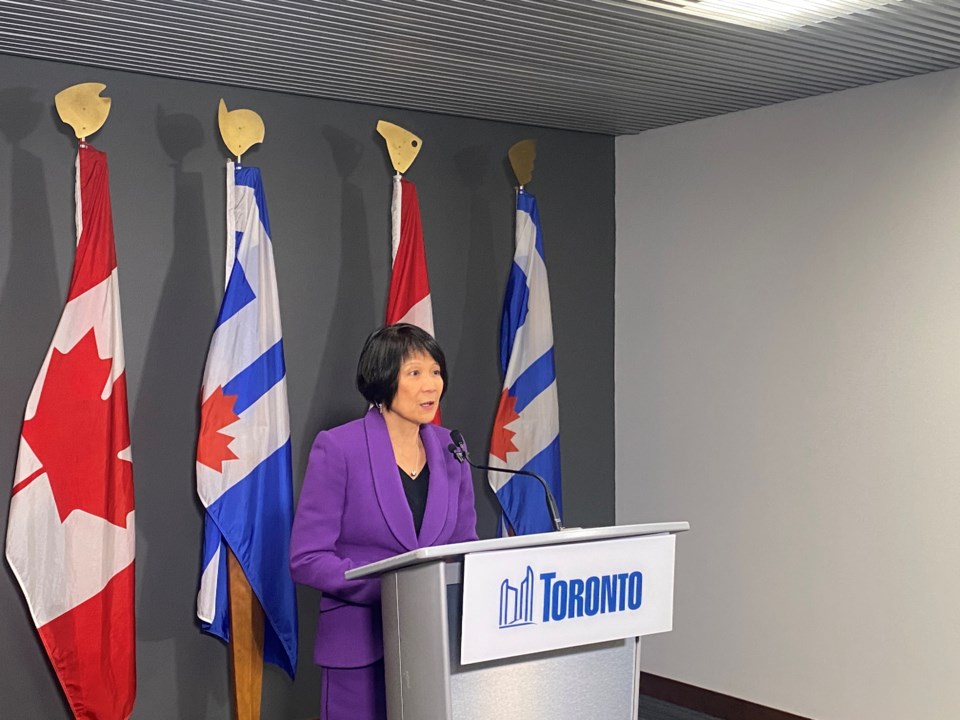The city is set to spend hundreds of millions of dollars to incentivize the construction of over 8,000 rental units after council approved the first phase of one of Mayor Olivia Chow’s central housing promises.
In November, council approved Chow’s proposal to defer development charges, waive planning and building fees, and forego property taxes to help build badly needed rental housing.
Councillors voted overwhelmingly on Tuesday to move the plan forward.
In total, the program will help build nearly 8,200 rental units, a quarter of which will be affordable. It will cost the city nearly $460 million in foregone revenue.
City staff reviewed dozens of applications from developers and recommended council approve 17 projects.
The approved projects vary in size from as little as 33 units at 2760 Dundas Street West to 1,818 units near Lake Shore Boulevard and Spadina Avenue. Six of the projects are in downtown Toronto.
Five of the projects were previously planned as condos but converted to purpose-built rental to access the program.
Staff received 75 applications totalling around 32,600 units, far more than they could approve based on how much money was allocated to the program.
“The response from the developers exceeded our wildest expectations,” Chow said on Tuesday morning.
Another push for more cash from Ottawa, Queen’s Park
If the federal and provincial governments jump in with billions of extra dollars requested by council, the city has another 58 applications worth nearly 25,000 units that could be approved through the program.
On Tuesday, Chow and city staff repeated their calls to higher levels of government for more money to help the city cut taxes and fees on more units.
The city can’t do it alone, staff said, because it doesn’t have enough money.
Former federal housing minister Sean Fraser told TorontoToday in November that he’s “willing to work with the city” and potentially provide some of the money.
Potential federal cash could be made available through the Canada Mortgage and Housing Corporation’s financing programs or the Canada Housing Infrastructure Fund, a new $6-billion program unveiled in the 2024 federal budget, Fraser’s spokesperson said last month.
Fraser, however, resigned from the federal cabinet on Monday and no replacement has been named.
On the provincial level, Premier Doug Ford government’s hasn’t explicitly ruled out giving Toronto more housing funds — but hasn’t been as forthcoming as its counterparts in Ottawa.
Chow is asking the province for $1 billion to help the city pay for the tax and fee cuts on thousands of other rental units, plus another $225 million in grants to subsidize the affordable units.
“Ontario encourages all municipalities to continue finding ways to reduce local costs and burdensome red tape that slows down the construction of much-needed housing,” a spokesperson for Ontario Finance Minister Peter Bethlenfalvy told TorontoToday.
Chow’s original plan targeted 7,000 total rental units, 1,400 of which would be “affordable,” as defined by the city’s income-based affordability threshold.
The program will deliver more than the initially planned 7,000 units because some of the affordable projects were already partially approved but were stuck because of unfavourable market conditions, staff said.
To qualify, according to the city, an affordable one-bedroom unit would cost $1,090 per month. A two-bedroom would cost $1,661 per month and a three-bedroom would cost $1,858 per month.
